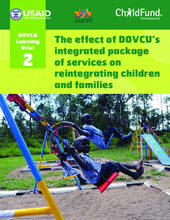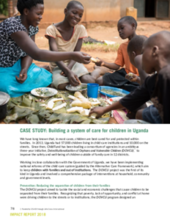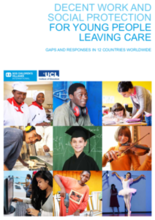Displaying 681 - 690 of 991
This paper examines how types and sources of social support vary by youths’ foster care placement and foster care status at age 19.
In order to define what support is necessary for the successful emancipation of young people leaving alternative care in Serbia, this study of 150 young people in care aims to analyse both their preparedness for leaving alternative care, and whether the type of placement (kinship, foster, or residential) makes a difference to the level of preparedness.
In August 2016, Anglicare Victoria established the Home Stretch campaign to lobby all States and Territories to extend the transition from state out of home care (leaving care) age from 18 till at least 21 years.
This learning brief analyzes quantitative data from the second of the “Deinstitutionalization of Orphans and Vulnerable Children in Uganda” (DOVCU) project’s stated objectives: examining the extent to which DOVCU project interventions decrease vulnerabilities for reintegrating children and their families.
For this study, physical and mental health, school achievement, justice involvement and child protection contact were explored for three cohorts of children in Australia born between 1 January 1990 and 30 June 1995.
This case study from ChildFund's 2018 Impact Report describes the Deinstitutionalization of Orphans and Vulnerable Children (DOVCU) initiative in Uganda, which aims to to improve the safety and well-being of children outside of family care.
This review seeks to identify and summarise findings from literature about the nature of relationships that develop between older children and young people, and those caring for them within and beyond residential and fostering settings.
The aim of this report from SOS Children's Villages is to increase the knowledge and understanding of the needs and rights of young people ageing out of alternative care around the world, in order to inform strategies, policies and services to improve their life chances and outcomes through appropriate preparation for leaving care as well as after-care support.
This dissertation was an ethnographic narrative study tracking eight young women who were “aging out” or forced to leave their orphanage in Peru, where most of them had spent a majority of their lives. The study examined the way in which a collaborative art community could support the participants as they narrated their lives over a 16-month period of time through photojournaling and social media outlets.
Catalyzing Business Skills is a suite of three financial literacy and business skills curricula developed by Making Cents International and Child Fund's Economic Strengthening to Keep and Reintegrate Children into Families (ESFAM) project in Uganda.





